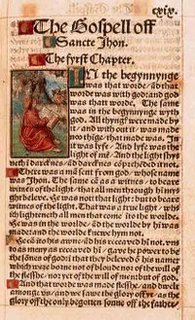 Tyndale translated the Bible into English for the common people, at a time when it was only available in Latin for priests. The people weren't allowed to read the Bible. The Catholic church tries to get round this, objecting along the lines of, "We aren't against people reading the Bible! There wasn't demand for the Bible in English from the common people! Besides, portions were already available in English here and there." Well, if you effectively teach people that to be a good Christian they just need to go to mass to check the priest's doing his job right on their behalf in a mysterious God-language, then sure, you won't create much desire to read the very words of God in your own tongue. Keep God at arms length, keep from hearing what he said and says, and you can continue to be religious... God's word was silent in the land.
Tyndale translated the Bible into English for the common people, at a time when it was only available in Latin for priests. The people weren't allowed to read the Bible. The Catholic church tries to get round this, objecting along the lines of, "We aren't against people reading the Bible! There wasn't demand for the Bible in English from the common people! Besides, portions were already available in English here and there." Well, if you effectively teach people that to be a good Christian they just need to go to mass to check the priest's doing his job right on their behalf in a mysterious God-language, then sure, you won't create much desire to read the very words of God in your own tongue. Keep God at arms length, keep from hearing what he said and says, and you can continue to be religious... God's word was silent in the land.Tyndale saw the need for God's word and pressed ahead despite opposition - famously saying, "I defie the Pope and all his lawes. If God spare my life, ere many yeares I wyl cause a boy that driveth the plough to know more of the Scripture, than he doust." And he saw the opportunity - the printing press.
He fled to the continent (he was fluent in most continental languages as well as Biblical Greek and Hebrew!) to publish the work, smuggling his New Testament into England in barrels. Betrayed and arrested in Antwerp in 1535, he was held in a castle until his heresy trial of 1536 and murder. What did he do in the castle? Mope? Feel sorry for himself? Do exercises to keep warm? No, his letter to a local landowner contains requests for a warmer coat as his is worn through and he's ill with cold - but most of all, for his Hebrew grammar, dictionary, and Hebrew Scriptures, so he could keep working on the translation of God's word for the common person.
He was just one man, who in translation made some mistakes. But thank God for how much he can use just one fallible man for the propagation of his powerful word, which is able to open not only the eyes of the king of England, but of all in whom the Spirit works.



2 comments:
Good to see history on the mind. It's like our society's life story. Culturally we dont do history anymore, so we dont know where we've come from and we dont know where we're going. Something like the popular grasp of the reformation is reduced to "catholics in power killed protestants, then vice versa, then civil war" I bet 1 in 100 know why free thinking scholars were executed in Oxford back then.
Been much on my mind recently how this permeates & cripples our society, assumptions, politics, christian priorities (eg in Europe "we need to be in high places/media..."), the lot...without knowing history we are powerless in defence & emboldened in arrogance, with no way to check ourselves. Hmm...must stop ranting. make the comment chris.
I read "God's Outlaw" (evangelical press) by Brian H. Edwards this summer - the story of Billy T & the english Bible. Brings to life the story full of God's unseen hand - highly recommended (*tho obviously written as reformed propaganda to wake up the church to the gospel!)
Anywho, it explained that "humanist" didnt carry the connotation of today. In studies people simply studied "Divinities" - the study of God or "Humanities" - everything else. If I had the book here I could find a great explanation but I dont. Sorry, but it just means it may not be as alarming as you think. Erasmus, for instance was a "humanist", but also a devout christian, reading the bible in greek and realising the errors of rome but wihtout the guts to speak against the system.
I was also surprised to hear you say Tyndale was before the reformers. Early, sure, and with none of the safety of establishment, but he was a contemporary of Luther, and incredibly pastorally astute, risking his cover to encourage evangelicals in prison - & so astute that while learning from Luther, he didnt fall into many of the mistakes Luther did (eg he refused to split fellowship over 2ndaries, eg different protestant views of the Lord's supper). Above all he never let the huge temptation of safety in Germany sidetrack him from his translation & printing of more and more into english, Thank God he didnt love his life so much as to shrink from death (Rev 12).
i talk too much. chris
Hm, interesting. Whereas I suspect that Erasmus didn't go all the way with the reformers because he didn't actually believe what they did - he was a humanist, not a protestant.
Thank you for correcting me on Tyndale & reformers - the short of it is, I was confused and made a complete mistake on that one! I've edited it now - cheers.
Post a Comment